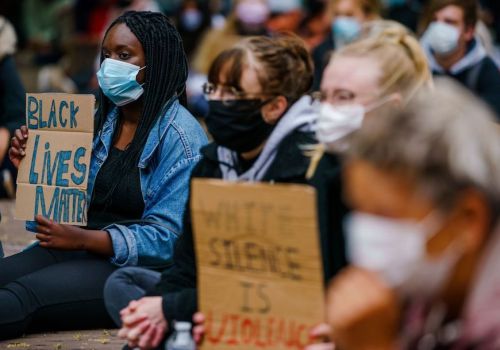4 ways to fight through social justice burnout while still doing the work
How do you manage to fight social justice burnout when the cause is as consequential as systemic racism? A psychologist has four tips for activists.

As if burnout wasn’t already on the rise, the pandemic arrived to spike levels of an everyday fatigue known as stress. Now that exhaustion is compounded as people work so hard and endlessly in so many ways to move the needle toward social justice. That exhaustion, that social justice burnout, is very, very real, so how do you fight it when you’re trying to fight against something as consequential systemic racism?
“Given the nature of the current anti-racist revolution, stress levels have risen even more dramatically,” says clinical psychologist Carla Marie Manly, PhD. “The demands have been particularly taxing on our first responders, front-line protesters, devoted public officials, and Black individuals who have ardently promoted anti-racist programs. All of the effort expended—physical, mental, and emotional—has taken an exhausting toll on those who have been fervently working to promote social justice and positive action.”
And as it is, burnout can physically alter the body in so many ways: negatively impacting sleep, fostering brain fog, messing with emotional regulation, and “even impacting existing medical conditions,” says Dr. Manly. “Ongoing exhaustion—even if due to a most vital cause—is deleterious for the body and mind.”
And it’s usually followed by maladaptive coping mechanisms that can take the form of compartmentalization, unemotional problem-solving, overwhelming emotions, or becoming highly avoidant and shutting down. Ultimately, Dr. Manly finds that none of these coping styles are optimal in the long run. Instead, you want to juggle four concrete elements.
“Self-optimization during challenging times requires a balanced approach that allows for problem-solving, positive action, emotional processing, and self-care,” says Dr. Manly. “When all four of these factors are acknowledged and addressed, individuals are far more likely to avoid the negative side-effects of burnout and exhaustion, while becoming more effective, focused, and resilient.”
How to cope with social justice burnout
1. Problem-Solving
In this scenario, it’s more about identifying a problem. For white allies especially, it might mean acknowledging your personal role in systemic racism, and finding a specific way to remedy it.
Something that’s struck me during this time is a Tweet by poet Lindsay Young: “Resistance is NOT a one lane highway,” she wrote. “Maybe your lane is protesting, maybe your lane is organizing, maybe your lane is counseling, maybe your lane is art activism, maybe your lane is surviving the day. Do NOT feel guilty for not occupying every lane. We need all of them.”
2. Positive Action
The next step then is identifying your lane. Maybe your righteous rage is best used in a protest. Maybe you’re still working during the movement, but you can give money to organizations that really need it. Maybe you’re immunocompromised and out of work, but you still have the ability to provide a signal boost for important content.
“An action-oriented statement coupled with problem-solving would be, ‘I’ve realized that I’ve had racist attitudes that have been problematic,” says Dr. Manly. “I’ve decided to read several books on this issue and take part in peaceful protests in order to begin to address my problematic negative attitudes. In short, we can solve a problem, but not take action to change—or we can solve a problem and then move forward with conscious action to effect change!”
And if you feel a civic duty to do as much as possible, travel every avenue that leads to revolution, that’s a choice, too. Then it becomes more of a matter of identifying your limits, and finding extra room for the next two things.
3. Emotional Processing
Emotions right now are complicated, intense, electrified, and exasperated. It’s a teased-out mess. Sometimes you need to find time and space to vent your anger. Allow yourself to have a good, long cry. Purge write your emotions off the eyes of Facebook (or on it, if that feels more cathartic). Talk to a trusted loved one or a therapist.
If you’re a member of the Black community and really need the support right now, there are plenty of mental health resources that can help you find support. For example, Real is offering Real to the People group therapy sessions. And therapy kind of ties to the last piece of the pie.
4. Self-Care
Same rules apply as when the pandemic started: There are plenty of bare minimum basic actions that you can do to take care of yourself. Small ones might be making sure that you have water and a snack on you when you’re protesting for hours on end. Maybe it’s trying to keep away from traumatic images of police brutality that populate your newsfeed. Or it could be allowing yourself half an hour to watch your favorite TV show for a mental break before bed, just so you can get in enough sleep necessary to do good work in the morning.
“When we take care of ourselves, we then avoid making errors or having lapses in judgment that often occur as a result of being overly exhausted,” says Dr. Manly. “In essence, when we slow down to adopt a balanced self-care and cause-focused approach, we are able to do the most good without causing harm to the self or others.”
Sign Up for Our Daily Newsletter
Get all the latest in wellness, trends, food, fitness, beauty, and more delivered right to your inbox.
Got it, you've been added to our email list.










